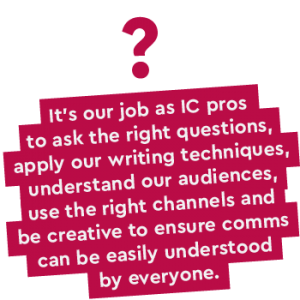What IC pros can learn from comedian extraordinaire, John Oliver, about making the complex simple…
Comedy shows that mock politics and topical issues, are nothing new. But British comedian John Oliver has introduced a fresh angle with his American talk show, Last Week Tonight.
On the surface, a show that features topics like net neutrality, cryptocurrency, and the Argentinian debt crisis, is likely to have you reaching for the remote control. But if you’ve never watched Last Week Tonight, I’d recommend giving it a go, just to see a masterclass in how to engage people with topics that on the surface seem complex and dry.
Not only is it funny, and educational, but the show is exposing real world issues, that certain people would rather the average Josephine on the street remained ignorant to. But taking a topic like net neutrality and making it easy to understand without being patronising, and genuinely interesting is no mean feat.
And it’s been so successful, his show has influenced US legislation and court rulings – it’s even been dubbed ‘the John Oliver effect’.
So, how does he do it, and can we replicate it for internal audiences?
Inject some comedy – using the right format
Last Week Tonight covers some pretty sobering and depressing topics, but first and foremost, John Oliver is a professional funny man, and manages to find a comedic angle in nearly everything.
Take an episode about the growing US prison population, which raised awareness of a depressing epidemic, but managed to squeeze in jokes about Cheerios, Sesame Street, and Puss in Boots.
It’s funny yet still makes a serious point. But what makes this approach work so well is the format it’s delivered in. One presenter, talking straight to camera, covering topical issues, in an informal style with some humorous elements thrown in. The audience are aware the jokes are at the expense of the antagonists in Oliver’s stories, not the topic itself or the victims involved.

Many employees will watch shows like this in their personal lives and will be familiar and comfortable with the approach. So, while a corporate video channel might not include segments on prison populations, what would stop you having a regular video that covered topical issues, relevant to your employees, that used humour to make them more engaging rather than undermining their importance?
How refreshing would it be to hear a perspective on whether we should have another referendum on Brexit and how it would impact business for example, from someone who’s willing to share their opinion and add some humour, such as linking to this now infamous video of a woman’s exasperation at another referendum?
Be relatable
John Oliver feels like one of us. He champions the everyman by taking topics that impact real people and holding power to account.
And while he uses comedic elements to bring those issues to life, he doesn’t lose sight of the fact that his topics can often have serious consequences. He expresses outrage and disbelief at President Trump, sensitivity when covering a school shooting or indignation when corporates are misleading customers.
And at the other end of the spectrum, he doesn’t contain his schoolboy excitement when he goes to extremes, such as the time his show bought an enormous train set for city of Scranton TV station, wax works of several presidents or wrote a book about a gay bunny to go up against anti-LGBT rights, Vice President, Mike Pence’s similar, yet non-gay themed work of children’s literature.
He also doesn’t take himself too seriously, often making himself the butt of a joke, which immediately makes him more likeable – and trustworthy. People believe he’s genuine and is on the side of the audience, which in the current climate of fake news is worth its weight in gold.
The range of emotions demonstrated at the right time, shows he’s human and hasn’t been affected by his success on the other side of the pond.
How often do senior leaders really let their personalities shine through? The ones that do, where their employees feel like they know them a bit, are often held in higher regard. That obviously isn’t all it takes to be a great leader, but it’s a great way to engage people with you, the business and the direction its going in.
Know what’s in it for your audience
At the beginning of the show, the stories Oliver shares can seem quite obscure, but he’s quick to get to the crux of why it affects viewers. He creates a hook, that viewers won’t be able to walk away from, because it directly affects them such as immigration, fake news, the US election, and he makes it clear he’s going to break down something complex without being patronising.
All communicators know the importance of the ‘what’s in it for me’ factor, and Oliver uses it to great effect.
But while Oliver does pick topics that will matter to the American public, he also understands that his viewers are an intelligent bunch and isn’t afraid to bring in international topics like the Italian elections, Brexit, or the Puerto Rican debt crisis.
The what’s in it for me factor here, is that we should all care what goes on, on the global stage as in one way or another, it will eventually affect us. He challenges his audience to understand more complex issues, outside their comfort zone and flatters them by assuming they’ll get why it’s important.
Our in-house audiences can be a mix of roles, backgrounds, educations, etc, so it may be that one way of explaining a complex topic, won’t work for all employees. You’ll need to take different approaches, and really understand your various audiences and what they need to know.
Use plain English
As mentioned in the previous point, there’s a line between explaining something clearly and being patronising. Oliver doesn’t dumb down, he talks to his audience the same way he would to friends over dinner. He doesn’t use jargon and is quick to mock those that do.
He also points out when a topic is unnecessarily complex and brings it back to the what’s in it for me factor again, reminding the audience, there’s a reason it sounds complicated, because certain people don’t want you to understand.
Jargon so often slips into organisations, and often the people using it don’t understand something fully themselves or would rather others didn’t, creating an us and them situation. Anything that’s communicated in an organisation should be easily understood from the 17-year-old intern to the CEO – however complicated it might first appear. It’s our job as internal communicators to ask the right questions, apply our writing techniques, understand our audiences, use the appropriate channels and be creative in the way we convey information to ensure it can be easily understood by everyone.
Back up what you say with evidence
John Oliver isn’t just sharing his opinions. He evidences what he says throughout the show. Companies and individuals on the receiving end have tried to sue him, but none have been successful as his evidence has been indisputable. His show airs once a week, compared to his contemporaries who are on every night, meaning he and his team have time to do a lot of research and scripting to ensure what they share is factually correct and hits the mark from a delivery point of view.
This is an important point in making the complex simple, as it can be tempting to omit information if it doesn’t fit into a narrative, or exaggerate for comedic effect.
As internal communicators we have an ethical and moral obligation to ensure the information we share is accurate, timely and relevant. We can never assume the information we’re provided is correct, we should always do our own due diligence, otherwise we risk our credibility and the reputation of the organisations we work for.
So, next time you’re trying to find the simplicity amongst the complexity, take some inspiration from a man who does it week in, week out with an audience of 4.1million viewers – if it’s possible to make civil asset forfeiture engaging, we have nothing to worry about.
By Helen Deverell for Alive!
















